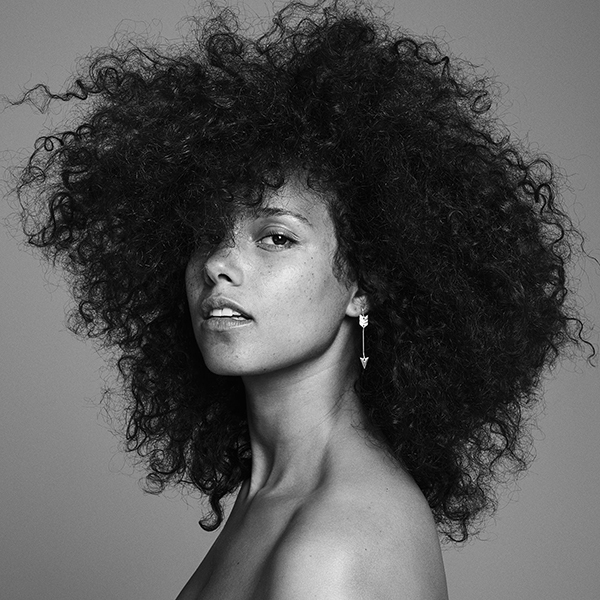If you’ve ever dismissed Alicia Keys as talented but maybe a bit vanilla, you really need to listen to her new album. Here shows off the incredible musicianship that’s won the Harlem-born artist 15 Grammy Awards, but also introduces a new, more personal and political side to her songwriting. With tracks exploring race, social injustice, and the female experience — as well as her relationship with music producer Swizz Beatz — it’s a relevant and rousing record that sits comfortably next to enlightening recent albums from Beyoncé (Lemonade) and Solange (A Seat at the Table). Here’s our track-by-track analysis of a record that sounds as though it will reveal more with each new listen.
The Beginning (Interlude)
“I’m the dramatic static before the song begins,” Keys tells us on this minute-long intro. “I’m the erratic energy that gets in your skin.” Could she be singing about the power of music? Either way, it’s intriguing.
The Gospel
The album’s first proper song is a thrilling blend of autobiography and social commentary, as Keys takes us back to her Harlem upbringing living “in a tenement… listenin’ to the hook.” Sam Cooke and Eddie Murphy both get name-checks, but this is no exercise in cozy nostalgia. “Poverty is a pain like you pullin’ a tooth,” she sings on a hard-hitting second verse.
Pawn It All
With its old-school hip-hop beats and gospel-tinged melodies, “Pawn It All” could be called a ghetto hymn. There’s a spiritual quality to the lyrics too, as Keys reminds us that love, perseverance, and family are more important than fancy physical possessions like diamonds and gold jewelry.
Elaine Brown
This powerful interlude sees former Black Panther Party chairwoman Elaine Brown recite the poem Black Mother by fellow BPP activist Alprentice “Bunchy” Carter. It’s a stark reminder of the oppression and hostility that America’s black women have faced and are still struggling to overcome.
Kill Your Mama
A stripped-down, soulful plea for change on which the new, more outspoken Keys doesn’t sugar-coat a thing. “Had your chance for redemption / But you fuckin’ blew it,” she sings angrily on the final verse.
She Don’t Really Care_1 Luv
This hypnotic two-part ballad is a celebration of young black women who could come from Brooklyn, Brixton, or anywhere, but also a lament that they don’t always know their own worth. “She think she want a baby and she do it with the wrong one / Cause she’s looking for something but he don’t really care,” Keys sings with empathy and regret. Musically, it continues the album’s classic hip-hop vibe with samples from A Tribe Called Quest and Nas.
Elevate
Speaking of Nas, he makes an uncredited guest appearance on this short but stirring interlude, saying encouragingly: “We always build, we always grow, we elevate.“
Illusion of Bliss
This slow-burning ballad sees Keys explore the pain of addiction with tenderness and, yet again, tremendous empathy. Her vocals on the bridge, when she sings “I’m sick of being judged / I’m sick of being sick,” are grittier and more visceral than we’ve ever heard from her before. Stunning.
Blended Family (What You Do for Love)
This midtempo R&B track is probably the album’s most honest and autobiographical moment. It’s a love song to Keys’s stepson and a celebration of her family life, which is no less loving because it’s “blended” and a little more complicated. “Blended Family” is simple, beautiful and so much looser-sounding than Keys has been in the past.
Work On It
Co-written and co-produced by Pharrell Williams, this doo wop-flavored ballad is all about Keys’s marriage to music producer Swizz Beatz. Their relationship may not be perfect, Keys tells us, but they’re always going to be working on it.
Cocoa Butter (Cross & Pic Interlude)
This poignant interlude features two men discussing women who are insecure about their stretch marks. “Her stomach was a prune but I still kissed her,” one says, pointing out that he actually sees her stretch marks as “beauty scars.”
Girl Can’t Be Herself
In May, Keys wrote an essay for Lena Dunham’s Lenny Letter explaining why she has decided not to wear makeup anymore. This folky R&B track, a kind of cousin to TLC’s “Unpretty,” expands on these themes. It’s an empowering song about shrugging off the pressure that society places on women to present themselves in a certain way. “When a girl can’t be herself no more / I just wanna cry, I just wanna cry for the world,” Keys sings on the gorgeous chorus.
You Glow (Interlude)
Almost an addendum to the previous song, this interlude sees Keys embrace the beauty of her blackness with a positive and enlightening memory from her childhood.
More Than We Know
Keys channels Lauryn Hill on this heartfelt hip-hop soul ballad about progress and change. “There’s no fate that you can’t create,” she sings encouragingly. It might have come off a little corny if it weren’t so genuine.
Where Do We Begin Now?
A downbeat but dramatic ballad on which Keys assumes the role of a woman about to enter tentatively into a same-sex relationship. “What we tell our friends now?” she wonders nervously on the chorus. It’s another empathetic moment which also shows a sexier and more yearning quality to Keys’ vocals.
Holy War
Here Keys appeals for compassion, tolerance and love in a world “divided by difference, sexuality and skin”. With its brilliant, arena-sized chorus, it’s a skillfully-crafted anthem that feels horribly relevant in the year of Brexit and Donald Trump.
Hallejujah
A stripped-down, gospel ballad which climaxes with Keys singing “let me in, let me in” over an approving patter of hand-claps. Stirring stuff.
In Common
On the one hand, it’s a shame that Keys’ under-appreciated summer single is tucked away at the end of the deluxe edition. Yet on the other, its trendy tropical beats don’t quite fit on an album that’s firmly rooted in R&B, hip-hop, and soul. Don’t skip it, though, because Keys has never sounded cooler.
Credits
Text Nick Levine
